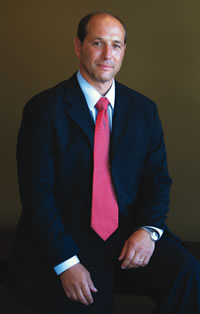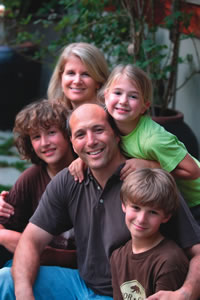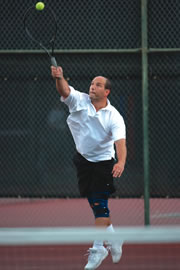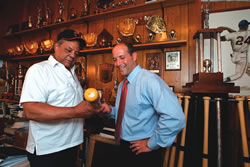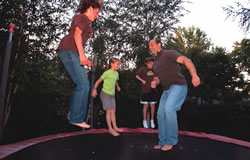

A Renaissance man takes on the bar presidencyBy Nancy McCarthy
On the walls of Jeff Bleich’s office hangs an impressive display of accomplishments — diplomas from elite schools, autographed photos of Supreme Court justices and other prominent figures, a sizeable collection of awards and honors, including a proclamation from the city of San Francisco declaring “Jeff Bleich Day 2003.” In the middle of it all, displayed with equal prominence, is a framed black and white picture of Elvis Presley’s wedding. In every corner there’s Elvis stuff: a life-sized cutout of The King in a gold lamé suit, Elvis bookends, pillows, a footstool, a lunchbox and a bottle of Elvis Presley conditioning shampoo. The office presents a mirror on Bleich’s life: extraordinary achievement coupled with a lack of pretense, a keen sense of humor and a balanced set of priorities. “Jeff has always been incredibly good at whatever he did,” says Alameda County Superior Court Judge Jon Tigar, a friend from law school. “But he’s also really funny and self-effacing, incredibly easy to hang out with, and just luminous. He’s the kind of person other people want to be around.” “Basically, Jeff is Superman,” says Michael Tubach, a partner at O’Melveny & Myers who met Bleich at Boalt Hall. “He seems to be able to do everything.” Indeed, so high energy is Bleich that besides being a partner with Munger, Tolles & Olson LLP in San Francisco, where his busy practice consists primarily of complex business litigation, he serves on the boards of 20 or so civic and charitable organizations. As he began his term last month as the 83rd president of the State Bar, he conceded that some of his extracurricular work will have to be curtailed, but he has the support of his wife and three children in the latest of his many endeavors. “I feel like I’m drinking champagne out of a hose,” he said. “It’s really good stuff, but I don’t always have time to savor it.” Bleich, who succeeded Los Angeles attorney Sheldon Sloan, plans in the coming year to visit all nine State Bar districts and has three main goals, although he believes the “agenda often ends up finding you.” He hopes to continue the work of recent bar presidents by implementing civility and pro bono pledges and enhancing a “diversity pipeline” initiative. He will travel to Sacramento seeking more funding for the bar, which faces a deficit. “We have to be open to the possibility of a modest dues increase,” he said, adding that he hopes to win a multi-year fee bill from the legislature. And he will devote much of his presidency to rebuilding trust of the bar, traumatized, he says, by a series of events in the last decade, including the Keller and Brosterhaus decisions (both restricting how member dues can be spent) and the 1997 veto of the bar’s fee bill. “We’re still carrying scars from that,” Bleich said. “Too many people perceive the State Bar as a little bureaucratic and not responsive to legitimate interests.” The most important role of the president, Bleich believes, is “being the face of the bar” and using the presidency as a bully pulpit for making its case, with the legislature, the state’s lawyers and the public. The bar presidency seems like a natural evolution for Bleich, 46, whose resume includes a clerkship with the late Chief Justice William Rehnquist, a year at the Iran-U.S. Claims Tribunal in the Hague, a year as director of the White House Commission on Youth Violence, a regular listing as a Superlawyer, vice president of the California State University Board of Trustees, authorship of a play, short stories and two books, with another book temporarily shelved, and awards too numerous to count. Oh, and he surfs and plays the bass guitar, trumpet and harmonica. Although Bleich demurs that he does “a lot of things in a mediocre fashion,” he’s clearly being modest. Says Judge Tigar, “Jeff is the most impressive person I’ve ever met.” Bleich showed an early interest in politics and sports in high school, when he was elected president of the Connecticut Student Association and was a member of the football and wrestling teams and a pole vaulter on the track team. His dad, Charlie, is a dentist and mom Linda worked as his receptionist. Bleich was not a top student, preferring the role of class clown, and in fact did so badly on a test in elementary school that his teachers ordered special testing. It turned out he hadn’t read the instructions.
Charlie Bleich said when Jeff and his older sister Deborah were growing up, the family had serious dinner conversations that touched on subjects ranging from the Supreme Court to the evolution of African Americans in American society. When his dad asked him about his goals, “He said, ‘I’d like to be a judge some day, I’d like to clerk at the Supreme Court, I’d like to meet somebody who looks like Candace Bergen and I’d like to move to California,’” the senior Bleich recalled. His son remembers his goals a little differently. “I think I wanted to be tall,” he laughed. “I wanted to be in the NBA.” Bleich got an academic wake-up call when he earned high SAT scores and a friend who was captain of the football team was admitted to a top university. Beyond worrying about his height, Bleich wanted to be a writer and “do lots of different things,” so he enrolled at Amherst, where he could immerse himself in the liberal arts and sports. He majored in political science, minored in economics, graduated magna cum laude and was disqualified from Phi Beta Kappa as the result of a fraternity prank gone sour. He met Becky, his wife-to-be, the first day of his sophomore year as she began her freshman year at Mount Holyoke. Although he’d been accepted at Harvard’s Kennedy School of Government, Bleich deferred for a one-year fellowship with the Coro Foundation in St. Louis, a job that suited a policy junkie perfectly by enabling him to devote six weeks at a time to a particular issue. He delved into juvenile justice, nonprofit work, the teachers union and political campaigning, among others. He was next accepted at Oxford but opted instead for two years of study at the Kennedy School to pursue his interest in public policy. Although he said he had no particular goals, he wanted to study as many areas as he could so he could “make an impact and . . . be prepared to make a difference.” With Mark Moore, a professor at the school, Bleich co-wrote a book about juvenile justice, “From Children to Citizens.” He also founded a student magazine, originally called the KSG Lampoon, until the Harvard Lampoon sent a cease and desist letter. The name was changed to The National Debt: You Know It Bothers You But You’re Not Sure Why. The staff mostly did silly pranks, wrote their own letters to the editor and engaged in sophomoric humor, Bleich said. He earned a masters in public policy and headed for Boalt Hall, continuing his pattern of “applying for everything except a paying job.” His wife grew up in northern California, the young couple was broke and Boalt was affordable; Bleich figured he could earn enough at summer jobs to manage the tuition. After winning the writing competition, he was elected editor-in-chief of the law review and worked for three prominent San Francisco law firms by the time he graduated with highest honors. He went on to clerk for Judge Abner Mikva at the U.S. Court of Appeals in Washington, D.C., and scored clerkship interviews with four Supreme Court justices. He wanted to clerk for Thurgood Marshall, whom he viewed as an icon before joining the court, but when Rehnquist called, it was an offer he couldn’t refuse.
Bleich said the chief justice asked him to supplement his resume with interesting tidbits, so Rehnquist learned that Bleich had sung in his high school a cappella group. “We would sing in the car on our way to play tennis,” Bleich says. “We sounded like two tone-deaf cats.” In addition to researching and drafting opinions, Bleich initiated what has become a traditional skit at the end of the clerkship; the premiere was a takeoff on People’s Court, in which the clerks nervously teased the chief justice about his idiosyncrasies. Even now, Bleich does a spot-on imitation of Rehnquist’s formal baritone. Along the way, the young lawyer acquired an interest in mad King Ludwig of Bavaria after touring his castle and was able to research his life at the nearby Library of Congress. Bleich wrote a two-act play about the mad king that he entered in a playwriting competition. It didn’t win, but he still harbors a desire to see it staged and encourages Becky, who sits on the board of the Berkeley Repertory Theater, to keep it in mind. Becky earned an MBA at Georgetown while Bleich was clerking and the couple’s next stop was The Hague, where he clerked for Judge Howard Holtzmann at the Iran-U.S. Claims Tribunal. Their son, Jake, was born in Holland and Bleich decided “it really was time” to pursue a serious job. “At some point you need to engage in the world in a sustained way.” He chose Munger Tolles, which had only four people in its San Francisco office, because it is values-driven, he says. Many firms talk about money or about their high-profile lawyers, but “at Munger, they talked about basic values. They didn’t do a lot of fancy stuff, they fly coach, stay at reasonable hotels, behave sensibly,” he says. Still thinking he would practice only a couple of years before entering public service or returning to academia, Bleich said he picked areas that really interest him. “I was always interested in issues and wanted to be involved in public policy,” he says, “but it never occurred to me you could do that from a law firm.” The firm created opportunities for him to be involved in a wide range of activities, from the Council on Foreign Relations to pro bono work to juvenile justice and non-violence, and Bleich dove in with gusto. He had some difficulty naming the case he is proudest to have handled — some, he said, were complicated and lucrative, others were resolved before reaching the lawsuit stage. But he cited the Matrix case in San Francisco, in which during his first year of practice he represented a class of homeless people targeted by then-Mayor Frank Jordan for violating nuisance laws by sleeping on or obstructing sidewalks. “They were being punished for the status of having no place to sleep at night,” Bleich said. The district court ruled against his clients, and while on appeal, the program was disbanded by a new mayor; the court of appeal held the case was moot. “We knew it was an uphill battle because so many people were willing to demonize the homeless,” Bleich said. “But it raised the profile of some important social issues.” After rising to partner in just three years at the firm, Bleich planned to take off three months to complete Supreme Finishes, a book he is still writing about what happened to the lawyers who appeared before the Supreme Court during his clerkship. Instead, he was tapped by President Clinton to head a commission on youth violence created in 1999 after the Columbine High School shootings. Commuting between Washington and the Bay Area, Bleich said the 15 months he guided the commission marked the hardest he ever worked. Using successful educational campaigns that changed people’s behavior, such as anti-smoking, anti-littering and drinking and driving as models, the commission set out to change how people think about violence. It created a public service advertising campaign, put in place violence reduction programs in several large cities, including Baltimore, St. Louis and Memphis, and started an anti-violence grassroots campaign among children. “This is an American issue, not a political issue,” Bleich said, adding that he thought the commission made real progress. Since then, he’s been president of the Bar Association of San Francisco (BASF), where he focused on connections between lawyers and the community and honed his diversity credentials, and is on the boards of the Boalt Hall Alumni Association, Human Rights Watch and the Legal Community Against Violence, among others. He is devoted to pro bono causes and has received numerous honors for public service. “He’s everywhere, he goes to every event,” says Martha Whetstone, former BASF executive director and a close friend. “He is just naturally a high achiever, and, combined with his charitable, benevolent soul, he’s always thinking there’s more he can do.” “He has limitless energy and enthusiasm,” added Rohit Singla, one of his partners, who says he’s never heard Bleich raise his voice or seen him rattled. “He can balance a really demanding high-end legal career with so much extracurricular stuff.” Bleich showed that balance on a recent typical day that began with a 6 a.m. tennis match at the Claremont resort, not far from his Piedmont home. He then headed for a meeting with former State Controller Steve Westly, now CEO of a venture advisory firm in Menlo Park. Both men work on Barack Obama’s campaign finance committee (Bleich has known Obama for 17 years), and met to talk strategy. Westly also questioned Bleich about the State Bar, curious about the new president’s plans. “I wasn’t sure I wanted to take it on,” Bleich admitted, explaining that the bar is “institutionally structured to be unpopular. First, you have the privilege of having to pay to take a really hard test. Then you have the privilege of having to pay dues, most of which go to discipline other lawyers. So (members) don’t see much benefit.” And the bar is in the “odd position” of acting as an arm of the judiciary and a trade association while simultaneously playing a public protection role, he explained.
When the meeting ended and after many phone calls, Bleich climbed back in his car and punched the name Willie Mays into his Nuvi, a GPS navigator whose disembodied voice directs him to his appointments. He spent two hours with the baseball great, offering advice on a variety of issues, including sponsorship and endorsement opportunities and the possibility of an autobiography. Bleich had traveled to Cooperstown a month earlier with Mays and agreed on this visit to serve on yet another board, this time for Mays’ Say Hey Foundation. Although he says he was tongue-tied the first time they met, he’s now comfortable with his famous client “but I remain in awe of him. He’s a friend and a client and I treat him the same as my other friends and clients. I’m very lucky to get to work with people of all different careers.” Bleich was late for his next appointment, at Applied Materials in Santa Clara, where he spent two more hours before heading back to his South of Market office, checked his phone messages and e-mail (he receives about 300 a day) and made it home by 7. His day ended with a 9 p.m. dinner with a documentary filmmaker. When he’s not traveling, he tries to be home for dinner with his wife and three children, Jake, 15, Matthew, 12, and 9-year-old Abby, and reserves every Thursday for a date with Becky, who says “it’s been easy to be in love with him all these years.” Without hesitation, Bleich said he is happiest “hanging out at the dinner table” with his family, who are his top priority.
“Jeff genuinely enjoys what he does, whatever it is that his day may bring,” says Becky. “He is a true ‘glass half full’ person. Jeff works really hard at all that he commits to (whether it’s a client, a relationship, or replacing the trampoline net) but he enjoys the process as much as the end result.” Given Bleich’s relative youth, his wide network of connections and his enthusiasm for a challenge, several of his friends suggested a high-level government job, whether on the Supreme Court or as attorney general, may lie in his future. “His heart’s in the right place, he’s a hard worker, he’s about the public good,” Whetstone said. “I just think Jeff needs to be shared with the world. He’s a gift to society.” Bleich ducked talk of the future, saying only that experiences “so far have taken me to some pretty high places.” The law, he said, is a hard profession in which “to manage your life effectively. I have a pretty good balance and I can’t think of a period when anybody was neglected. Life is kind of like a garden — everything has to be attended to a little each day.” |
||||||||||
|
||||||||||
